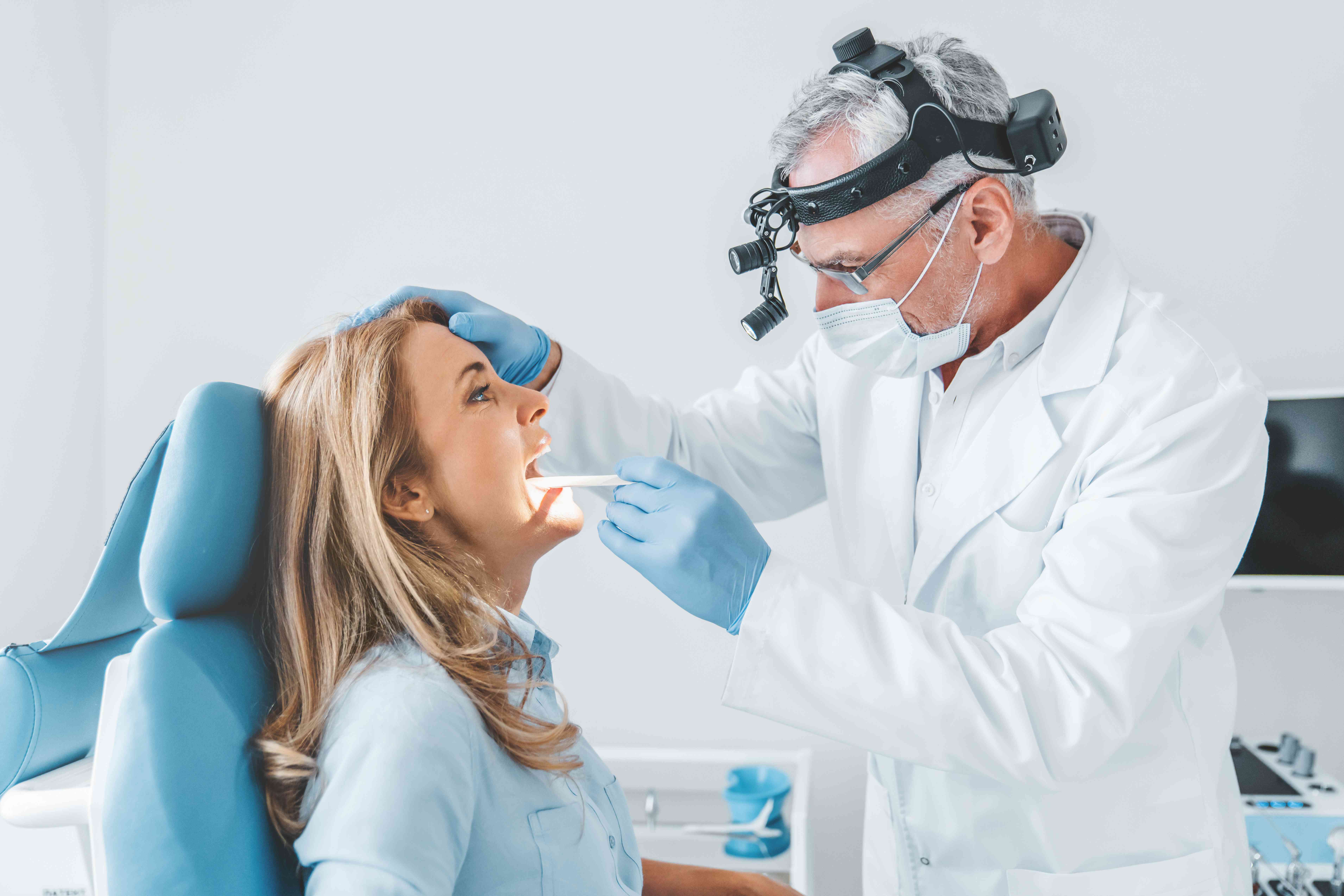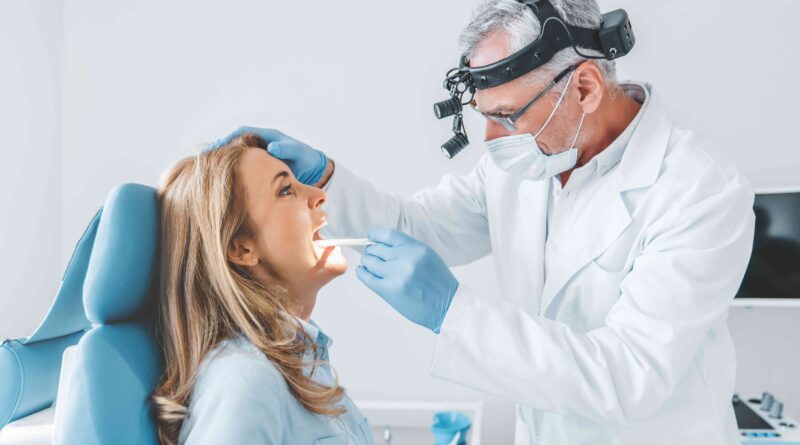Mouth Ulcer: Symptoms, Causes, and Treatment

A mouth ulcer is a sore or lesion that forms inside the mouth. It can develop on the gums, inner cheek, and roof of the mouth. Although it’s unclear exactly what causes mouth ulcers, allergic reactions, braces, retainers, and hormonal changes are some factors that can lead to their development.
It is not uncommon to get a mouth ulcer. Around 25% of young adults and an even higher proportion of children have experienced mouth ulcers.
The symptoms you experience depend on the type of mouth ulcer you have. Most mouth ulcers clear up on their own over time, but chronic mouth ulcers can be a sign of a more serious underlying issue. Many options exist to treat acute (temporary) or chronic mouth ulcers.
DermNet
A healthcare provider can better understand what type of mouth ulcer you have based on the underlying condition causing your symptoms.
The types of mouth ulcers you can get include:
- Traumatic ulcer: Being in an accident, eating extremely hot food, or accidentally biting the lining of your inner cheek can cause painful ulcers in the mouth, tongue, or gums.
- Canker sore: Also known as aphthous ulcers, canker sores are typically caused by viruses. Injury from dental work, immune system problems, or too much dental cleaning can also cause canker sores.
- Gingivostomatitis: Causing mouth ulcers and swelling, gingivostomatitis is a bacterial or viral mouth infection. It’s often associated with herpes simplex viral infection.
- Cold sore: A viral infection, herpes simplex causes small sores known as cold sores on the lips, gums, tissues of the mouth, and throat.
- Leukoplakia: Patches of white form on the inside of your lips and cheeks from chewing tobacco, wearing retainers or dentures, or smoking.
- Oral cancer: Cancer can cause red or white ulcers to form. These don’t go away on their own.
- Oral lichen planus: This allergic reaction leads to the formation of sores and lines in the mouth.
- Oral thrush: The growth of a fungus, Candida albicans, inside the mouth can cause patches of red and white in your mouth.
There are some differences in the way each type of mouth ulcer presents. Here are the symptoms you may experience if you have one of the following types of mouth ulcers:
- Traumatic ulcer: Traumatic ulcers appear on the lip; gums; or floor, roof, or sides of the mouth. You’ll develop a single sore that will be dark red and then lighter in the middle.
- Canker sore: Canker sores are painful bumps that are white or yellow in the center and surrounded by red. Often appearing on the inner cheeks, lips, tongue, or roof of the mouth, they may grow and become open sores, turning gray as they heal.
- Gingivostomatitis: The most common symptoms of this condition are swelling and the development of sores anywhere in the mouth or gums. Other symptoms may include bad breath, fever, and discomfort.
- Cold sores: The small, painful sores typically develop on the lips, tissues of the mouth, or gums. They may appear yellow, cluster together, and leak fluid. Before they develop, you may feel itching, burning, or tingling in the mouth or lips alongside fever, sore throat, and swollen glands.
- Leukoplakia: Appearing on the tongue, gums, or inner cheek, leukoplakia patches typically have a white or gray color. They have an uneven appearance and, in some cases, can be fuzzy. Affected areas can become painful when exposed to acidic or spicy foods.
- Oral cancer: Cancer in the mouth often affects the floor of the mouth or the area near your back teeth (molars). It often manifests as a single, persistent ulcer that is painless initially, but the presentation can vary.
- Oral lichen planus: The main signs of oral lichen planus are an itchy rash and light blue or white sores on the sides of the tongue, inside your cheek, or on your gums. The sores grow larger and become painful. Some sores may also show up with lines crossing each other on the surface.
- Oral thrush: This causes red and white patches on the walls, sides, or roof of the mouth, which may result in pain and bleeding.
The exact cause of mouth ulcers is unknown. An injury inside your mouth from braces or a virus can lead to a mouth ulcer. Health conditions like inflammatory bowel disease (IBD) and systemic lupus erythematosus (an autoimmune disease that affects healthy tissue) can cause mouth ulcers to form as well.
Risk Factors
Other health conditions beyond having braces or oral cancer can increase your chances of developing mouth ulcers.
Common risk factors for mouth ulcers include:
- High stress and anxiety
- Insufficient sleep
- Hormonal changes
- Vitamin deficiency
- A family gene that makes you more susceptible to mouth sores
- A weakened immune system due to an autoimmune disease or other condition
- Certain foods, including citrus, chocolate, and spicy foods
When diagnosing mouth ulcers, healthcare providers work to identify the root cause and test for potential serious causes. These can include leukemia, acute necrotizing gingivitis (a type of gum disease), or chancre (a painless ulcer due to sexually transmitted disease).
A healthcare provider may look at your mouth ulcer and have an idea of a diagnosis based on its appearance. In other cases, they may take a blood sample to ensure a condition like cancer or a vitamin and iron deficiency isn’t causing the ulcer. Some healthcare providers may suggest a biopsy—collecting a tissue sample from the ulcer to be evaluated in a lab.
The primary goal when treating a mouth ulcer is to relieve symptoms and reduce how often you get a mouth ulcer. Many treatments are topical medications that can be applied directly to the ulcer.
Prescription Medications
You might be prescribed a medication—potentially a mouthwash or topical ointment—to treat mouth ulcers. Medications for mouth ulcers include:
- Antiseptic mouthwash, such as Peroxyl (hydrogen peroxide) and Peridex (chlorhexidine)
- Corticosteroid mouthwash like Decadron (dexamethasone)
- Antibiotics such as Periostat (doxycycline) or Sumycin (tetracycline) that are dissolved in water to be used as a mouthwash
- Corticosteroid ointment, including Fluovix (fluocinonide), Qvar (beclomethasone), and Solu-cortef (hydrocortisone succinate)
- Anesthetic creams or mouthwashes, such as Bonjela (lidocaine) or Anbesol (benzocaine)
- Oral antibiotics, often Periostat (doxycycline)
- Antiviral oral medications, such as Sitavig (acyclovir), Famvir (famciclovir), or Valtrex (valacyclovir)
- Antifungal topical medications, including Mycelex (clotrimazole), Oravig (miconazole), or Mycostatin (nystatin)
Laser Therapy
Healthcare providers may use laser therapy in severe, recurrent cases of canker sores or ulcers caused by herpes simplex. Researchers found this treatment to significantly speed up healing. The sooner you receive treatment, the faster you can reduce pain in these types of mouth ulcers.
Vitamin Supplements
Healthcare providers may recommend vitamin or mineral supplements. Researchers found B vitamins help regenerate mucous tissue where mouth ulcers occur. They may sometimes combine supplements with pantothenic acid (also known as vitamin B5) to speed up healing. Vitamin B5 may also prevent mouth ulcers from recurring and reduce symptoms by reducing inflammation and promoting tissue growth.
Home Management
Several over-the-counter (OTC) and home treatments can relieve symptoms, including:
- Pain relievers, such as Motrin (ibuprofen)
- Anesthetics, such as Senatec (lidocaine), available as patches, sprays, or ointments
- Gently cleaning affected areas with antiseptic soap and water
- Applying ice or a warm washcloth to the affected area
- Gargling with saltwater
- Avoiding hot beverages and acidic foods
Canker sores are a type of herpes simplex ulcer sore that goes through periods of flare-ups (sudden occurrence of ulcers) and remission (when ulcers go away). Different types of sores require different methods of prevention.
You can take steps to prevent mouth ulcers. For example:
- Apply sunscreen or zinc oxide lip balm to sores exposed to the sun
- Ensure your lips are moisturized
- Keep up with oral hygiene, such as by regularly brushing and flossing
- Avoid contact with herpes sores
- Have a diet rich in vitamins A, B, C, and E
- Cope with stress and anxiety with exercise, mindfulness, or other self-care methods
Chronic mouth ulcers can increase the risk of several other health conditions occurring more often. These conditions include:
- Hyperlipidemia: This is the term for elevated levels of lipids (fats), such as cholesterol or triglycerides, in your blood. Researchers found about 17% of people with recurrent canker sores have hyperlipidemia compared to 13% without the sores.
- Headache: People with mouth ulcers were significantly more likely to experience headaches. According to research, 16% of people with chronic mouth ulcers experience headaches compared to 9.1% of those without sores.
- Liver disease: Liver diseases, such as hepatitis A, B, and C or cirrhosis, most commonly cause yellowing of the skin and eyes (jaundice). Researchers found that having liver disease slightly raised your risk of chronic mouth ulcers.
- Peptic ulcer: Mouth ulcers are associated with a 5.4% higher prevalence of peptic ulcers (open sores in the stomach or intestinal lining).
Speak with a healthcare provider if you notice your symptoms lasting for three weeks or longer. Mouth ulcers that last for too long can cause other conditions like cellulitis or a bacterial infection. Chronic mouth ulcers could be an early sign of a serious infection or oral cancer.
Most mouth ulcers are temporary, resolving on their own without needing treatment. Mouth ulcers are generally easy to treat. However, practicing good oral hygiene and regularly visiting your dentist is important to prevent them from worsening.





